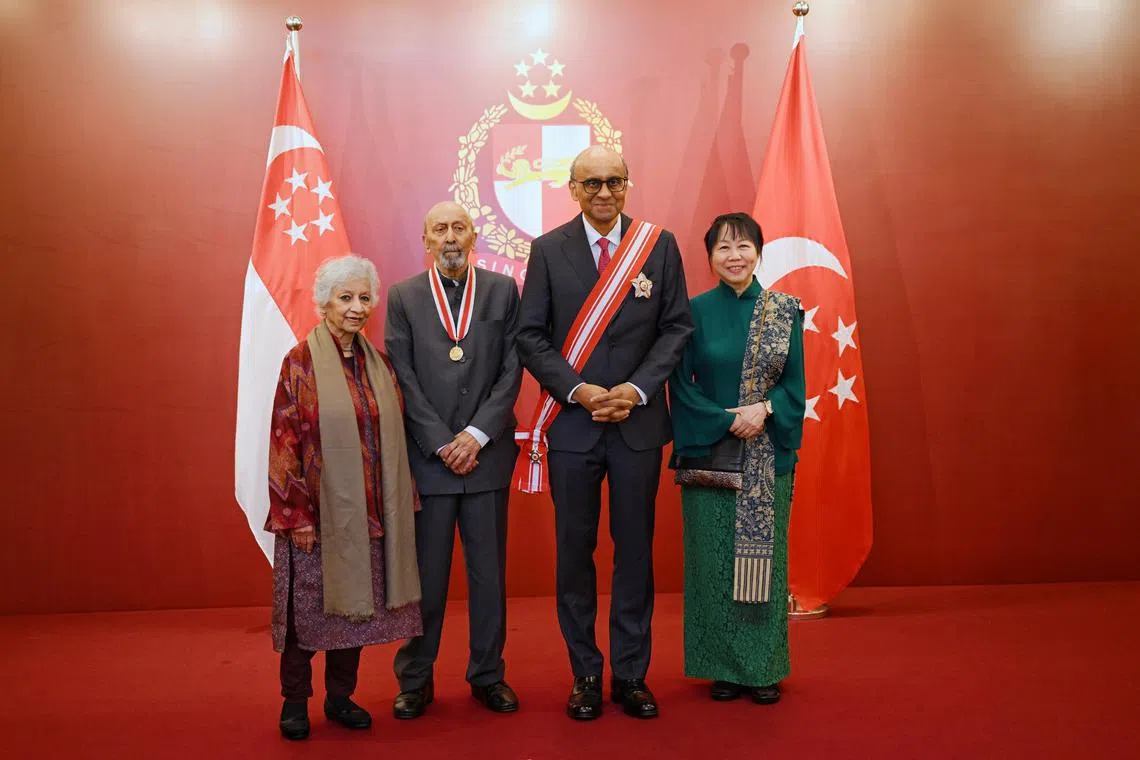NEW DELHI – Indian industrialist Tarun Das recalled how, back in 1993, he was all for the idea when Singapore’s then Prime Minister Goh Chok Tong “wanted to start an India-Singapore fever”.
“The fever has caught on,” said Mr Das in an interview with The Straits Times.
“The bilateral relationship has come a very long way. It’s come from zero to 70kmh – 70kmh because there is still a lot of potential,” he added.
Mr Das, who was director-general of India’s Confederation of Indian Industry (CII) at the time, was on his first exploratory visit to Singapore with a delegation of 18 Indian business leaders during the early phase of India’s economic liberalisation.
A 30-minute meeting with Mr Goh, who, Mr Das recalled, was extremely curious about India, stretched into 1½ hours and ended with an impromptu dinner.
“We had not gone to Singapore with great expectations, but we came away from Singapore with great expectations because this was a prime minister who was saying, ‘I want to have Singapore and India working together.’ And he started talking about a Singapore-India fever,” said the soft-spoken industrialist, 85, who helped steer CII into a powerful industry group.
A year after the initial meeting, CII set up its South-east Asia office in Singapore, enthused by the special interest taken by Mr Goh and as part of India’s Look East policy to build links with South-east Asia.
Mr Goh was Singapore’s second prime minister, from 1990 to 2004, while India’s Look East Policy was initiated by then Prime Minister Narasimha Rao in 1992.
For Mr Das, that 1993 visit was also the beginning of a three-decade-long deep, personal connection with Singapore which peaked on Jan 15.
Singapore conferred honorary citizenship on Mr Das in recognition of his contributions to championing Singapore-India relations over the years.
President Tharman Shanmugaratnam presented the award to Mr Das at a ceremony in New Delhi during his recent visit to commemorate the 60th anniversary of diplomatic ties between the two countries.
Mr Das, who was awarded the Singapore Public Service Medal in 2004, is only the second Indian to receive Singapore’s honorary citizenship. The late Mr Ratan Tata, former chairman of the Tata Group, was conferred the same award in 2008 for being a strong advocate of the Republic, and for his valuable contributions to its economic transformation.

(From left) Mrs Ranjana Das, Mr Tarun Das, President Tharman Shanmugaratnam and Mrs Jane Ittogi Shanmugaratnam are pictured together after Mr Das was made an Honourary Citizen of Singapore, in New Delhi on Jan 15.ST PHOTO: SHINTARO TAY
Singapore instituted the honorary citizen award in 2003 to recognise foreigners who have made extensive contributions to Singapore or who have made significant impact in the areas of business, science and technology, or information communications, among other sectors. It is the country’s highest recognition for a non-Singaporean.
Singapore’s Ministry of Foreign Affairs in a statement said that Mr Das personally spearheaded many initiatives to build bridges between Singapore and India, describing him as “one of Singapore’s strongest advocates in India” who went beyond trade and economics to foster closer ties between people on both sides.
For Mr Das, who has received many accolades in his lifetime – including the Padma Bhushan, India’s third-highest civilian award, in 2006 and the Order of the Rising Sun from Japan in 2018 – the honorary citizen award from Singapore is a singular honour.
“This one is way beyond. It is in a way a validation of the kind of work one has done,” Mr Das told ST on Jan 17.
Mr Das grew up in the eastern city of Kolkata – capital of West Bengal state – where he studied economics at St. Xavier College, and then economics, industrial sociology and social anthropology at Manchester University in Britain.
After returning to India from Britain, he joined the Bengal Chamber of Commerce in the early 1960s as a management trainee at the suggestion of his father who worked in labour management.
He went on to head the Association of Indian Engineering Industry. He then helped shift its headquarters from Kolkata to Delhi, renaming it CII in 1986.
Avoiding the limelight, Mr Das worked behind the scenes, networked in the corridors of power, established links with bureaucrats at different levels and slowly built up the industry body at a critical time when India, a protectionist economy, was opening up to the world.
Apart from Singapore, which he took a personal interest in, he also worked to establish links with other countries, including Japan and the US. Those who have worked with Mr Das say that he is a visionary, seeing very early on the benefits of India engaging with the world.
“His international outlook was amazingly optimistic. He believed in partnership and that was the number one reason we started our association at the CII level with Singapore,” said former CII president Subodh Bhargava, who had worked closely with Mr Das in CII.
“I think he had that very special quality of getting people together. And he always wanted to be in the background. That’s his humility.”
Amid all this, Singapore remained very much in focus.
Mr Das personally spearheaded many important initiatives, among them the annual visits to Singapore by CII to engage the Republic’s political leaders and businesses on developments in both countries and the region.
They also include the India-Singapore Strategic Dialogue, which was established in 2007, to promote economic and academic, cultural exchanges at higher levels between representatives from the Indian industry group and the National University of Singapore’s Institute of South Asian Studies think-tank.
There have been challenges along the way, he noted, with Indian companies initially resistant to the Comprehensive Economic Cooperation Agreement, which was inked in 2005.
But there was also a great desire by successive leaders on both sides to build up the India-Singapore relationship, he told ST.
Still, Mr Das added that there is much more that needs to be done to make Singapore companies feel comfortable in India.
“There is a communication gap between us. We are still (two) very different systems and processes. The mid-sized (Singapore) companies are still uncomfortable in India. And we have to help them to function here smoothly,” he said.
He said one way to help Singapore companies settle in more easily in India would be to offer ‘townships’, like the kind offered to Japan and South Korea in different parts of the country.
“Let’s start with a small township, and a township doesn’t mean a city. It just means a small enclave, you know, where all the companies can be there. The people from the companies can live there and they can have their own community centre or club or whatever they want to do so that they have the comfort of being together. I’m talking to people about it,” he explained, adding that he isn’t slowing down any time soon.
Among the many hats Mr Das wears is the chairmanship of the Sasakawa-India Leprosy Foundation. He also chairs the advisory board of construction equipment manufacturing firm JCB India and is an international advisory board member of Chubb Insurance.
However, he said his most fullfilling role currently is as director of the Singapore-India Partnership Foundation, which organises academic exchanges and other activities between the two nations.
In 2023, a group of students from the Singapore University of Social Sciences (SUSS) visited India as part of an immersion programme organised by the foundation.
Mr Das believes that such cross-cultural exchanges are a good way to introduce a new generation of Singaporeans to India.
“The idea is to get the (people of) Singapore and India together, and bridge the gap of communication, knowledge and awareness while they are young, and that’s what we are doing,” he said.
“I think that’s going to change the future between the two countries.”
Mr Das lives with his wife in Gurgaon city, south-west of New Delhi. They have a daughter living in the US and two sons in India. While his wife and their sons have been to Singapore, his daughter has yet to visit, he said.
- Nirmala Ganapathy is India bureau chief at The Straits Times. She is based in New Delhi and writes about India’s foreign policy and politics.
Join ST's WhatsApp Channel and get the latest news and must-reads.

 By The Straits Times | Created at 2025-01-18 21:10:41 | Updated at 2025-01-19 02:25:12
5 hours ago
By The Straits Times | Created at 2025-01-18 21:10:41 | Updated at 2025-01-19 02:25:12
5 hours ago








